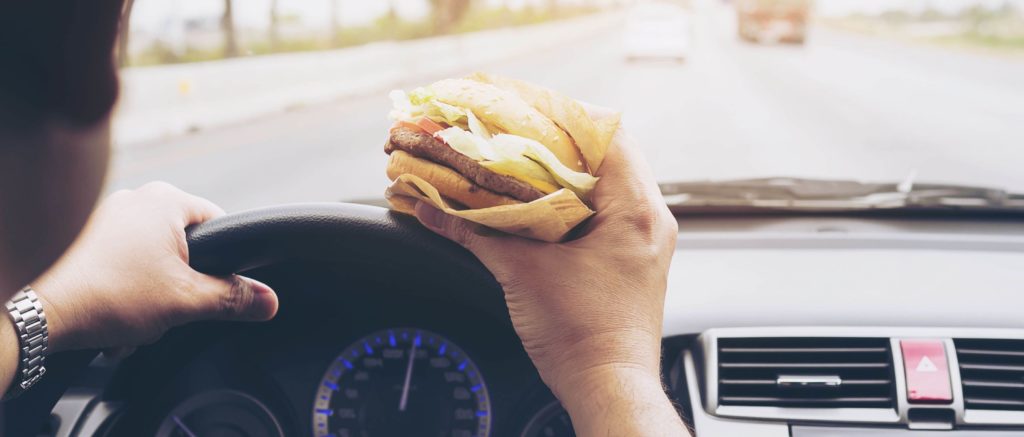Are Eating and Driving Considered Negligent?
When people think of distracted driving, they mostly think about talking or texting on the phone. But, in reality, distracted driving comes in many forms. One that just about every driver is guilty of doing is eating while driving.
Many people assume that eating and driving is not reckless. Why would there be drive-through restaurants if it were so dangerous, then?
There are currently no laws, and there may never be, that prohibit eating and driving; however, the act itself and causing an accident is still considered negligent. If an accident caused by a driver who was eating and you get injured, you can file a personal injury claim to recover your medical bills and other losses.

Eating is a Distraction, and Distracted Driving is Negligent
People are free to eat and drive, but if they choose to do it, and they are distracted, they are choosing to ignore their duty to drive safely.
Every driver has a duty of care owed to other drivers, passengers, cyclists, and pedestrians. They must obey the rules and laws of the road, and drive as safely as possible. If they are doing something they know could cause harm to someone else, they should and must stop that behavior.
Someone who is eating and driving are openly disobeying this duty. The following is what happens when a driver eats:
- One or both hands are not on the wheel.
- The driver focuses on the food rather than the road.
- The driver’s mind focuses on eating, not driving.
Distracted Driving Statistics to Consider
The National Highway Traffic Safety Administration says the odds of a wreck due to eating and driving go up by 80 percent. A study carried out by Lytx found that drivers who drank or ate were 3.6 times as likely to crash as those who didn’t. NHTSA even said that most near-crashes, 65 percent, involve these drivers.
The Centers for Disease Control and Prevention, based on a report from the NHTSA in 2012, reported that accidents involving distracted drivers accounted for the death of 3,328 people and injuries to approximately 421,000 others.
So, while it may not seem like a big deal to grab some food to go, it is. Every year, tens of thousands of people die in serious accidents. In 2015, for instance, 35,092 people were killed. Per capita, that’s 10.9 fatalities per 100,000 people.
Eating and Driving Accidents Are Preventable
One of the worst issues with eating-related car accidents is that they are 100 percent avoidable. Just like sending or reading a text message, eating can wait. Drivers can plan to avoid becoming insatiably hungry on the road; and, if they get hungry enough to stop for food or pull out a snack, they can park and eat instead of choosing to put themselves and others at risk for acute – or perhaps fatal – injuries.
NHTSA lists it as one of the top dangerous types of issues facing the distracted driving problem in the country. Some foods that NHTSA specifically contains as hazardous include cream-filled and powdered donuts, fried chicken, BBQ food, hamburgers, soups, chili, tacos, coffee, jelly donuts, soft drinks, and chocolate.
Recovering Just Compensation For Eating and Driving Accidents
Distracted driving is negligent driving. It does not matter whether the distraction is a cell phone, a GPS device, a map, or food. All drivers owe a legal duty to exercise due care on the public roadways. Allowing any non-driving activity to get in the way of driving safely can result in financial liability.
Lawsuits involving distracted drivers are complex and require a skilled and resourceful distracted driving accident lawyer to establish the liability of the driver and any potential third parties.
Speak to an Experienced Law Firm
If you or someone you love has been injured in a car accident, a lawyer from Harris & Harris will help file a personal injury lawsuit are here to help. We provide aggressive legal representation for victims of distracted driving accidents, and we help our clients demand more for their injuries and losses. If you would like to speak with an experienced car accident lawyer, call us now at (702)-384-1414 for a free consultation or contact us online.